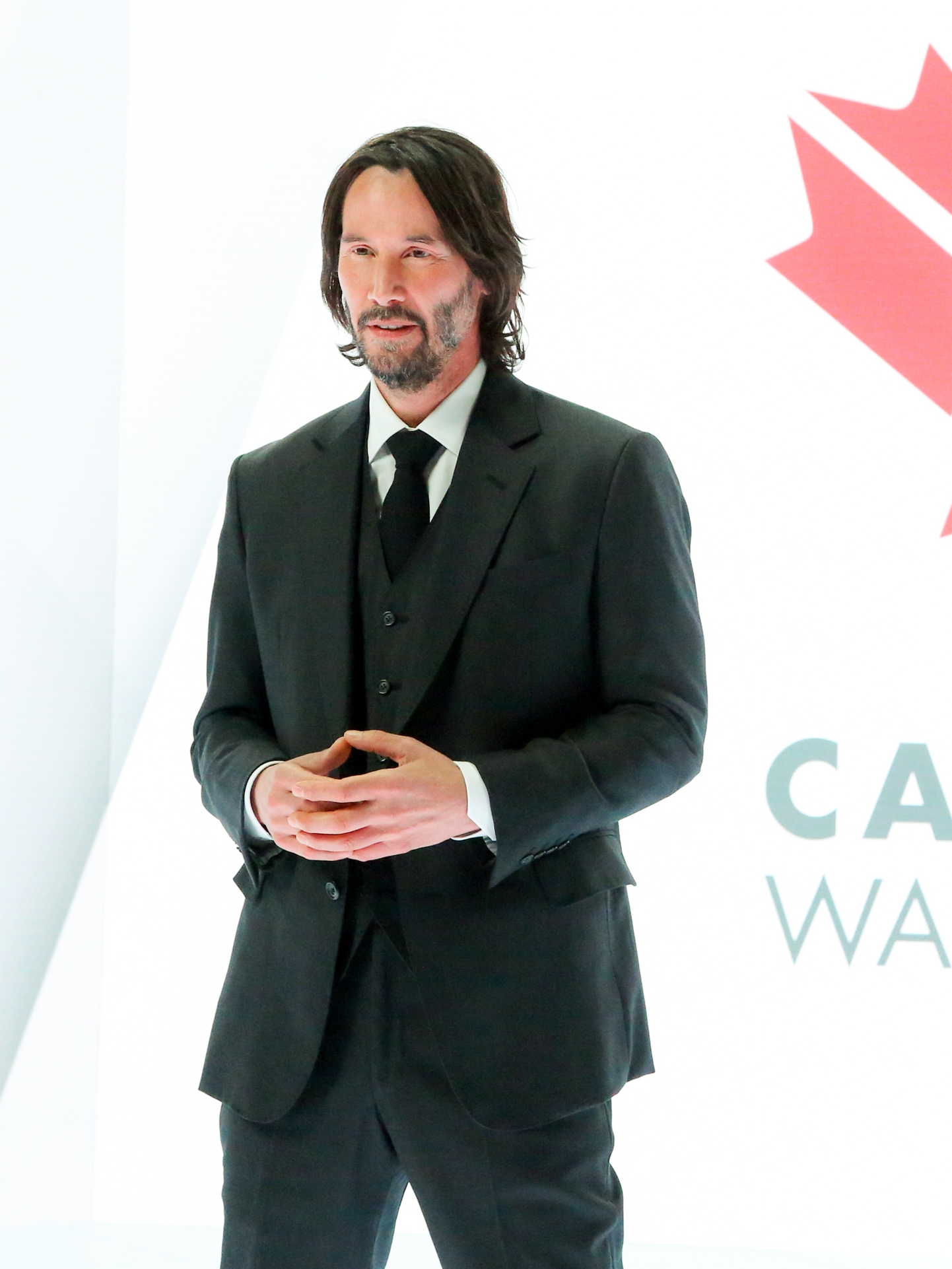
SOURCE PHOTOS: Colin Medley; JC Olivera/Getty Images; Tijana Martin/ The Globe and Mail; Rich Fury/Getty Images for Vulture; Christopher Katsarov/The Globe and Mail; George Pimentel/The Canadian Press; John Woods/The Canadian Press; Chris Young/The Canadian Press.
- Provocateur of the Year
- Arts Surprise of the Year
- Poetry Ambassador of the Year
- Most Unlikely Arts Hero of the Year
- Television Boundary-Breakers of the Year
- Storyteller of the Year
- Children's Storyteller of the Year
- Whoa-Dudes of the Year
- Arts Province of the Year
- Musician of the Year
- Music Industry Disruptor of the Year
🏆 Canadian Arts Heroes of 2021
Sign up for The Globe’s arts and lifestyle newsletters for more news, columns and advice in your inbox.
Canadian Provocateur of the Year: Simu Liu

Simu Liu attends the Canadian premiere of Shang-Chi and the Legend of the Ten Rings in Toronto.George Pimentel/The Canadian Press
If Hollywood’s film and television industry is like a mystery box, then Canada’s film and television sector is like a mystery box wrapped in a riddle, inside an enigma. So it was extraordinary this past June when Canadian actor Simu Liu broke down his explosive behind-the-scenes thoughts on the controversial premature end of the hit CBC comedy Kim’s Convenience, for all of social media to see.
We can talk another time about exactly what did and didn’t go wrong on the set of the sitcom, but the fact that Liu decided to say anything at all that wasn’t vetted by levels upon levels of PR teams makes him a remarkable exception to the typical “no comment” landscape.
“It goes back to being as argumentative with my parents as I was in my teenage years,” Liu told The Globe earlier this year. “There was definitely a lot of rebellion, a lot of me trying to fight for, you know, just being able to go out and see my friends. So yeah, I guess you could say it’s a part of who I am.”
That Liu didn’t mask who he was just before his big-screen superhero debut in Disney’s Shang-Chi and the Legend of the Ten Rings gives him an extra point for what-do-I-care coolness.
-Barry Hertz
Canadian Arts Surprise of the Year: Cliff Cardinal

Crow's Theatre presents William Shakespeare's As You Like It, a radical retelling by Cliff Cardinal.Dahlia Katz/Crow's Theatre
Is it unusual to start a year-end piece with a spoiler alert? Yes, but as far as I know, no one in theatre has ever dared to do what Cliff Cardinal did with his “radical retelling” of William Shakespeare’s As You Like It, which opened Crow’s Theatre in Toronto in September. The show is next set to have a run at Vancouver’s PuSh Festival in January, so if you’re thinking of seeing it there stop reading now.
Here’s what happened: Cardinal, a playwright born on the Pine Ridge Indian Reservation who self-describes as “polarizing,” took the stage before As You Like It to deliver the land acknowledgement.
The night I was there, it was the National Day for Truth and Reconciliation – so I wasn’t surprised this went on a little longer than normal. Eventually, however, I realized that this was the show. It then became fascinating to watch audience members individually and in groups gradually figure out that there wasn’t going to be any Shakespeare.
The Land Acknowledgement, as Cardinal’s solo show was actually called, was on one level a deconstruction of a ritual of reconciliation some believe has become rote. It was also a caustic critique of “allyship” – and a furious condemnation of the Catholic Church in the wake of this summer’s discovery of unmarked graves at residential schools. The “ruse” – as Cardinal and his “creative co-conspirators” Chris Abraham and Rouvan Silogix called it – also happened to function as a clever hacking of theatre’s overreliance on the Bard.
I heard from many theatregoers who said it was a night they’ll never forget, as well as a few who were upset or even triggered by the unexpected content. Abraham, also Crow’s artistic director, tells me of 2,300 who attended, 22 complained and nine refunds were issued.
-J. Kelly Nestruck
Crow’s Theatre will be first not-for-profit theatre in Toronto to reopen doors this fall
Canadian Poetry Ambassador of the Year: Canisia Lubrin

Poet and writer Canisia Lubrin.Chris Young/The Canadian Press
Canisia Lubrin is a daring and masterful poet, a new force as an editor and an influential teacher. In 2021, she became a household name (well, as close as any contemporary Canadian poet can come to being a household name). Lubrin, 37, won Yale University’s Windham-Campbell Prize, along with her mentor Dionne Brand – the first time two Canadians have won the US$165,000 prize in the same year. Lubrin’s book-length poem The Dyzgraphxst (pronounced “diz-GRAFF-ist”), published in 2020, was the Canadian winner of the 2021 Griffin Prize and won the 2021 OCM Bocas Prize for Caribbean Literature.
In its citation, the jury for the $65,000 Griffin Prize called it “a spectacular feat of architecture called a poem.” Also this year, Lubrin became poetry editor at McClelland & Stewart, taking over from Brand, whom she calls “the major influence in my writerly life.”
Born and raised in St. Lucia, Lubrin moved to Toronto when she was 17 and now lives in Whitby, Ont. She is assistant professor in the School of English and Theatre Studies at the University of Guelph and incoming MFA in Creative Writing coordinator. “I’m just a little girl from an extremely poor fishing village on an island in the Caribbean who loves language and storytelling and who took a great leap of imagination,” she told The Globe and Mail after winning the Windham-Campbell in March. “It does not feel like a leap of faith; it feels like a leap of imagination, because I think imagination’s a lot faster than faith.”
-Marsha Lederman
Canisia Lubrin wins Griffin Poetry Prize
Most Unlikely Canadian Arts Hero of the Year: Melly Shum
Melly Shum, of Goemans Appliances, at the store, in Markham, Ont.Tijana Martin/The Globe and Mail
As statues of colonialists and slave owners toppled in 2021, an Ontario appliance sales rep emerged as an unlikely new hero for the arts in Europe. In February, the Witte de With Centre for Contemporary Art in Rotterdam renamed itself the Melly Art Institute, honouring an image of Canadian Melly Shum that has graced its building since 1990.
Today, Shum sells high-end fridges and stoves in Markham, Ont., but when the Rotterdam centre was established she was an art student in a class taught by Canadian artist Ken Lum at the University of Ottawa. Lum had asked Shum and other classmates to pose for his work in an empty university lab. When his art was featured as the inaugural exhibition at the Witte de With Centre, the artist designed a poster for the building showing a smiling Shum with some outdated equipment and the text: MELLY SHUM HATES HER JOB.
Rotterdamers interpreted the work of public art as a timely protest against capitalism and when the billboard came down at the end of the show, there were so many complaints it had to be restored. The image has been there ever since and Melly, queen of the dead-end gig, is now a beloved civic icon.
More recently, the centre, named for the street where it is located, sought to drop a colonial name: Witte de With was a 17th-century Dutch naval captain with a reputation for bullying his men and destroying an Indonesian spice crop. Naturally, the centre thought of its popular billboard. Back in Canada, Shum approves of the name change but the irony is that the real life Melly, who went into retail after art school, just loves her job.
-Kate Taylor
Ontario’s Melly Shum, a symbol of worker dissatisfaction, is an unlikely civic hero in Rotterdam
Canadian Television Boundary-Breakers of the Year: Bilal Baig and Fab Filippo
Fab Filippo and Bilal Baig, the creators of CBC's new comedy original Sort Of.Tijana Martin/The Globe and Mail
Some TV series arrive pulsing with ambition and ostentatiously demanding your attention. Sort Of came fully formed and utterly confident about its sensibility, story and characters.
Sabi (Bilal Baig) is living an oddly bracketed life in Toronto. They’re twentysomething, gender fluid and work as a nanny by day, and bartender by night. They’ve got artists friends, dress as they like and are tempted to go to the “queer dreamland” of Berlin with a friend. But their mother doesn’t know anything about their trans existence. Things happen and stuff must get sorted out, but Sort Of moves along with its own rhythm, tight writing, deadpan humour and authentic emotional heft.
It’s both sweet and tart, a concoction you’ve never quite experienced before, yet its sense of life in Toronto is uncannily accurate and true. The series is getting rave reviews as it streams on HBO Max in the United States, with Nina Metz of the Chicago Tribune praising “its singular confidence and full-blooded sense of fun.” Judy Berman in Time magazine called Baig, “one of the most intriguing new voices I’ve encountered on TV this year.”
There is particular pleasure and satisfaction in seeing a Canadian series with such unusual virtues engage and dazzle American critics and viewers. What Sort Of’s co-creators Baig and Fab Filippo have done is inculcate an excitement about a strand of Canadian storytelling, one that’s distinctly contemporary, goodhearted and razor-sharp funny. It’s about a family and the family is us, with all our flaws and graces. Sort Of is so good you miss it as soon as the eight half-hour episodes end. You miss the characters, the humour, the compassion and insight. This small, uncategorizable series is made with such imaginative verve that its resonance is huge.
-John Doyle
Trans actor Bilal Baig breaks boundaries in CBC series Sort Of
Sort Of: A charmer and certain way forward for CBC TV
Canadian Storyteller of the Year: Miriam Toews

Author Miriam Toews.Christopher Katsarov/The Globe and Mail
She has taken us into a version of this world again and again, yet each time it is as fresh and revelatory as if it were our first trip there. Miriam Toews is a master storyteller. And this year, her storytelling gave us a magnificent novel and a critically acclaimed film, while another film based on her writing went into production, starring Hollywood A-listers.
Toews, 57, creates characters that can pierce a reader’s (or viewer’s) soul. Months after reading Fight Night, published in August, you’ll still be thinking about Swiv and her grandmother, Elvira. Swiv, suspended from school for fighting, is in Elvira’s care while Swiv’s mom, a pregnant actor, attends play rehearsals.
The story unfolds from Swiv’s perspective in a letter to her father, who has disappeared, leaving the three generations of women to fight on. Swiv’s child-on-the-cusp-of-maturity observations, parroting the adults around her with a mix of her own reflections, are hilarious and profound.
“I don’t know why saying bowel movement and stool is better than vag and piehole. It doesn’t matter what words you use in life, it’s not gonna prevent you from suffering.”
The L.A. Times called Fight Night the Ted Lasso of novels. It was the only book to make both the Scotiabank Giller Prize and the Atwood Gibson Writers’ Trust Fiction Prize shortlists. The screen adaptation of Toews’s All My Puny Sorrows had its world premiere at the Toronto International Film Festival; this month TIFF named it one of Canada’s top 10 films. Sarah Polley is directing an adaptation of Toews’s novel Women Talking, starring Frances McDormand and Rooney Mara.
The Globe asked Toews about achieving all this success – and personal joy; she’s a grandmother herself now – against the backdrop of family tragedy in her own life and a pandemic. “Those things are always playing against each other,” she responded, “aren’t they?”
-Marsha Lederman
Miriam Toews’ new novel Fight Night pays tribute to her mother
Canadian Children’s Storyteller of the Year: David A. Robertson

David A. Robertson at Jack River School in Norway House Cree Nation.Handout
At the beginning of The Barren Grounds – the first book of David A. Robertson’s middle-grade fantasy series The Misewa Saga – Morgan is feeling pretty alone. She’s 13, Indigenous, living in yet another foster home. She finds refuge in old fantasy books. “She liked the worlds that authors imagined and how she could imagine herself in them,” Robertson writes.
As a kid, imagination was essential for Robertson, a band member of Norway House Cree Nation, in order to picture someone like himself in the books he was reading. “I’ve always been driven by the absence in my childhood of Indigenous literature,” he told The Globe and Mail this year. “Growing up in the ‘80s, I can’t think of any books for kids about Indigenous people by Indigenous writers.”
Times, thank goodness, have changed – and Robertson, who lives in Winnipeg, has had a lot to do with that.
It was not your imagination: Robertson, 44, was everywhere this year. He won the 2021 Writers’ Union of Canada Freedom to Read Award. On the Trapline, his picture book with Julie Flett, won the Governor General’s Literary Award for Young People’s Literature – Illustrated Books. The second book of the Misewa Saga, The Great Bear, was published in September. ABC Signature acquired film/TV rights to the series. The Barren Grounds came out in paperback and is still a bestseller.
It is not unusual to see Robertson’s name repeatedly on various lists (his 2020 memoir Black Water was also going strong this year). Three of his books – On the Trapline, The Great Bear and Sugar Falls: A Residential School Story – made the Canadian Children’s Book Centre’s list of favourite books of 2021. And when McNally Robinson revealed its Winnipeg bestsellers for the last week of November, three of the top five children’s books were written by Robertson.
-M.L.
Eight Indigenous children’s authors discuss the books that inspire them
Canadian Whoa-Dudes of the Year: Seth Rogen and Keanu Reeves


Have any Canadian artists had better pandemics than spiritual siblings Seth Rogen and Keanu Reeves? The former spent 2021 producing a metric ton of enjoyably edgy comedies, promoting one of the best celebrity memoirs ever, further cementing his status as a cannabis kingpin and somehow found time to also become … let me check my notes here … a super-star in the social-media world of pottery?
Not one to be out-whoa’d, Reeves is sneaking up on the 2021 zeitgeist, too, shooting another John Wick film, writing an acclaimed comic book, getting some well-deserved recognition via Canada’s Walk of Fame and this month starring in one heck of a buzzy sequel: The Matrix Resurrections. Your move, Ryan Reynolds.
-B.H.
Keanu Reeves among 2021 inductees to Canada’s Walk of Fame
Seth Rogen’s sorta-memoir Yearbook is a true comedy high that needs no pharmaceutical supply
Canadian Arts Province of the Year: Quebec
In most of Canada, there’s been a slogan adopted by the performing arts and live music sector to explain how hard they have been hit by the pandemic: First closed, among the last to recover. In Quebec, however, the provincial government has decided that the second part need not necessarily be the case.
Take the performing arts: In March, 2021, theatre companies in that province reopened with full indoor productions to distanced, masked audiences. By fall, they were mostly back to a normal level of production activity, even sooner than venues were allowed 100-per-cent capacity audiences (vaxxed and masked).
How did Quebec pull it off? The Coalition Avenir Québec (CAQ) government introduced measures in late 2020 that subsidize the most unpredictable revenue stream for live entertainment: ticket sales. Eligible theatre companies, for instance, are guaranteed a certain amount of money based on the best box-office haul of three years pre-COVID. This versatile program, recently extended to the end of March, acts as a form of insurance should shows be cancelled due to government restrictions; as a top-up when only reduced-capacity audiences are allowed; and, most recently, as a support for shows and artists whose audiences aren’t yet returning in pre-pandemic numbers.
In terms of money filtering down to artists making art, the CAQ’s approach has been a major success, Conseil québécois du théâtre co-president Rachel Morse says. Theatre companies have been able to hire the usual number of artists and artisans (rather than programming small shows cautiously). Morse estimates Quebec has invested almost $100-million to date on the measures for performing arts producers and presenters and others for music venues and producers. That doesn’t seem like much when you consider individual Broadway productions have been eligible for grants of up to US$10-million to get back on their feet in normally arts-funding-allergic United States. -J.K.N.
Canadian Musician of the Year: Allison Russell
Singer-songwriter Allison Russell in Nashville, Tenn., on April 24. Her album Outside Child was among the best albums of 2021.Bethany Mollenkof/The New York Times
“I was in bondage for a decade,” singer-songwriter Allison Russell told National Public Radio earlier this year. She was talking about the abuse suffered at the hands of her adoptive father as a young teenager in Montreal. Now based in Nashville, Russell’s debut solo album Outside Child is a Southern-styled folk-pop memoir that isn’t focused on the trauma, but on “art and community and chosen family,” according to Russell.
Part of Russell’s community is Our Native Daughters, a group that includes Rhiannon Giddens, Amythyst Kiah, Leyla McCalla and Russell, who on the 2019 album Songs of Our Native Daughters, collaborated on songs that address America’s history of slavery, racism and sexism. Together or individually, the group members and others represent a welcome surge in Southern-styled roots music by Black women.
In 2021, Russell in particular enjoyed a breakout year. Outside Child was judged as one of the top albums of the year by Variety, the New York Times and the Bitter Southerner. She’s also up for three Grammy Awards. Russell has already won acceptance – now she might wish to work on her speech.
– Brad Wheeler
The top 10 Canadian albums of 2021
Canadian Music Industry Disruptor of the Year: Cadence Weapon
Rapper and writer Rollie Pemberton, who's stage name is Cadence Weapon.Christopher Katsarov/The Globe and Mail
This summer, rapper Rollie Pemberton (who works professionally as Cadence Weapon) went public over grievances with his former record label in a personal blog post. “I travelled the world and played hundreds of shows but I was penniless the entire time,” he wrote, “always hungry …”
His issues with his label were specific, but the problem was universal. Young recording artists rarely make much money on their albums, and, as such, are often perpetually in debt with labels for the cost of making music.
Months after his blog-post protest, the Edmonton-born but Toronto-based Pemberton won the 2021 Polaris Music Prize as the Canadian album of the year for Parallel World, a poetic and socially conscious work of hip hop. The redemption story was potent. “I wanted it to be like I was rapping my last breath,” Pemberton told media after his win. Last breath? One imagines there’s much more huff and puff where that comes from.
– B.W.
Does Polaris Music Prize winner Cadence Weapon want Justin Trudeau’s job?
Cadence Weapon wins Polaris Music Prize for ‘Parallel World’




 J. Kelly Nestruck
J. Kelly Nestruck Brad Wheeler
Brad Wheeler Marsha Lederman
Marsha Lederman Barry Hertz
Barry Hertz Kate Taylor
Kate Taylor